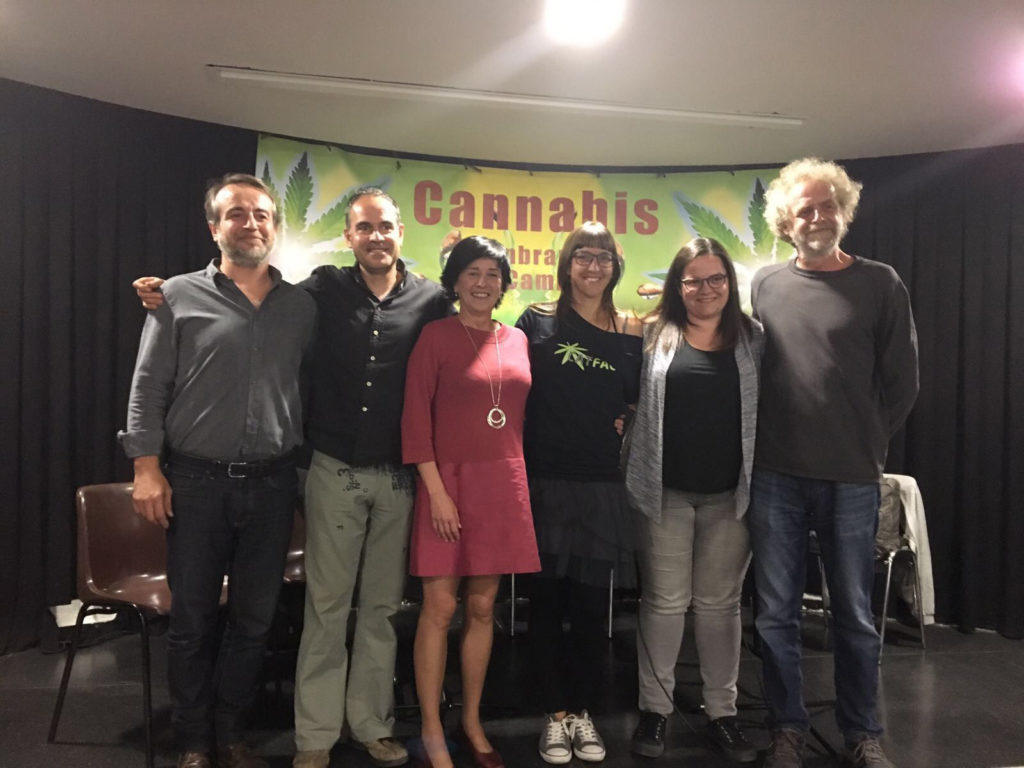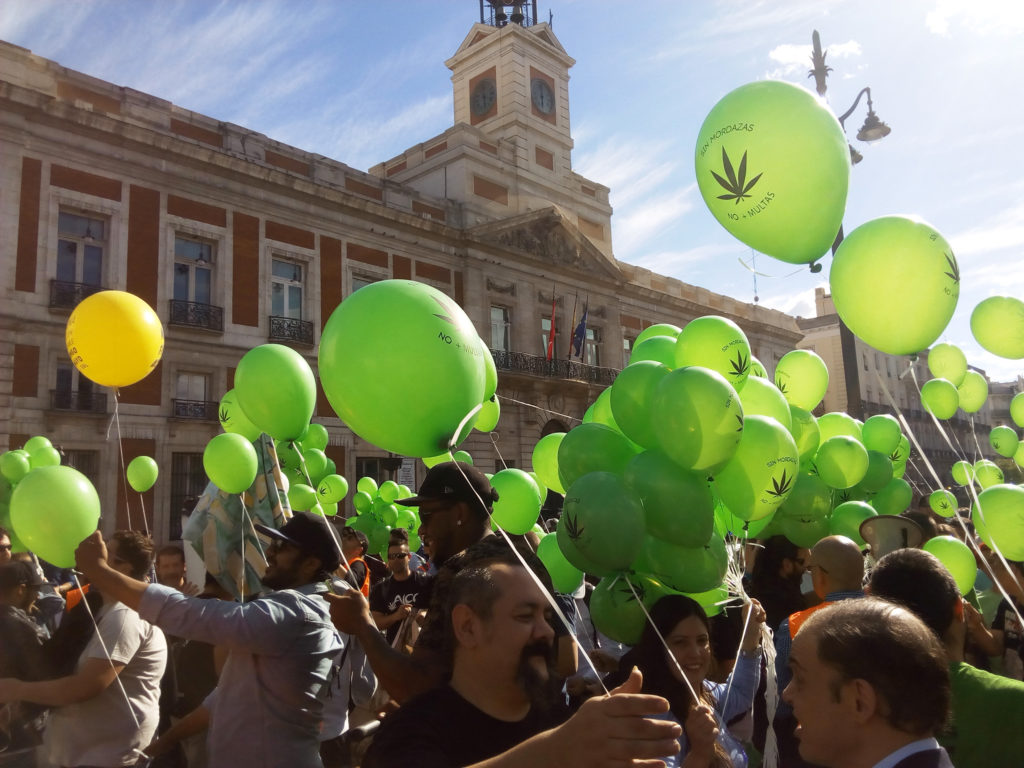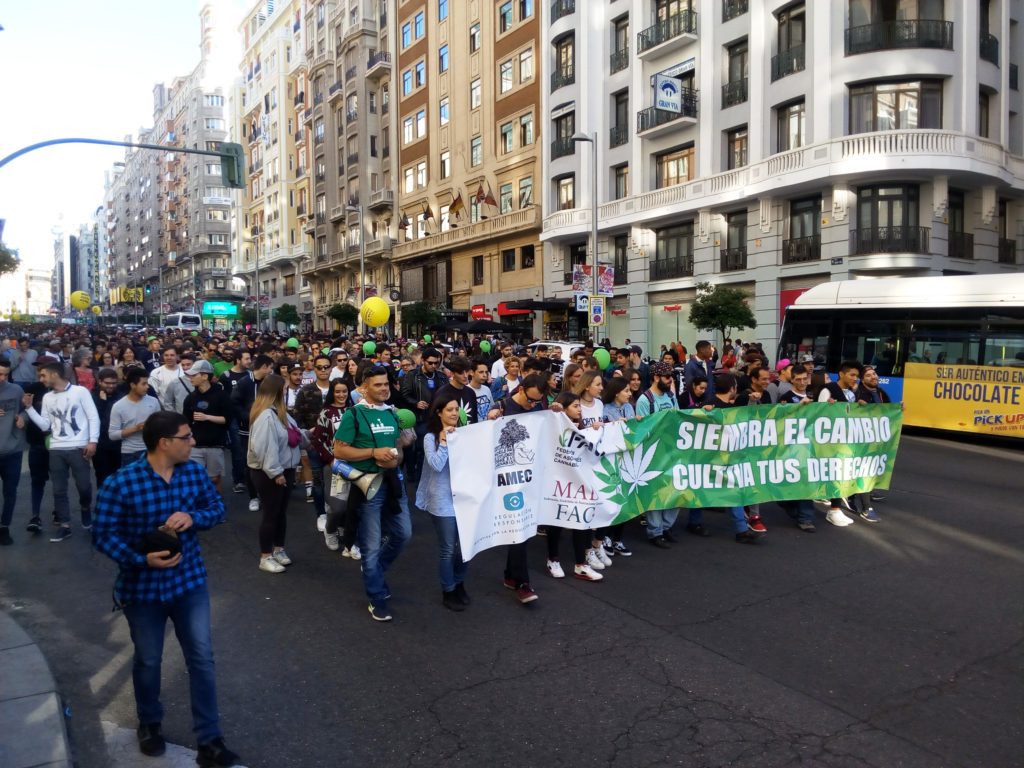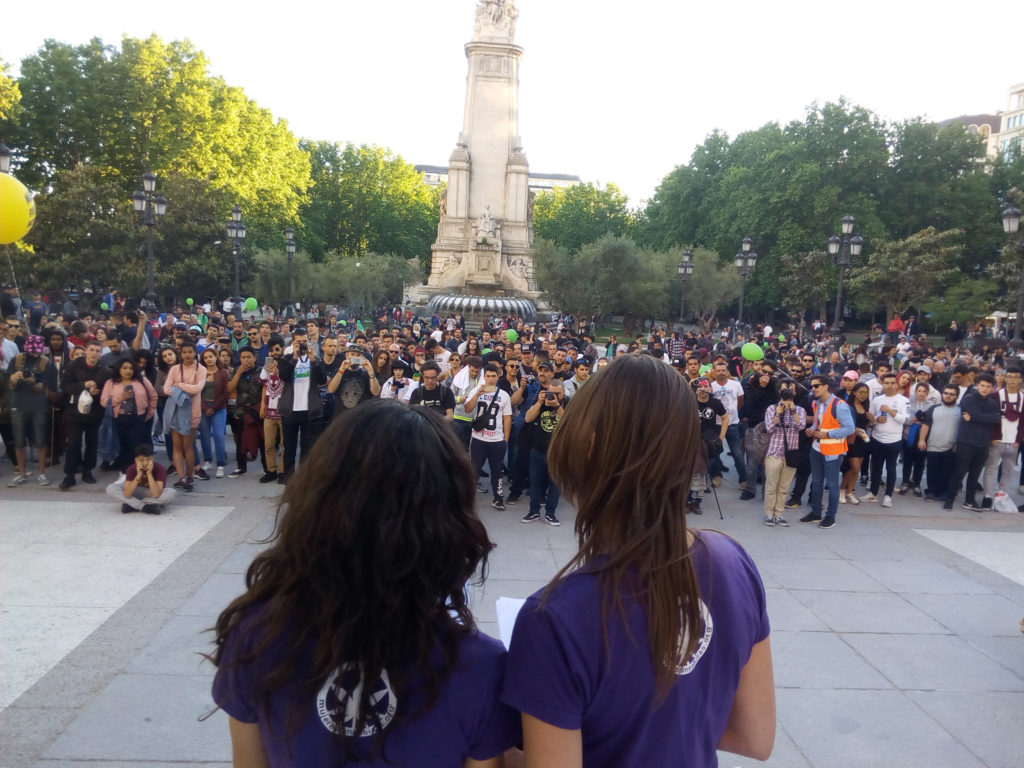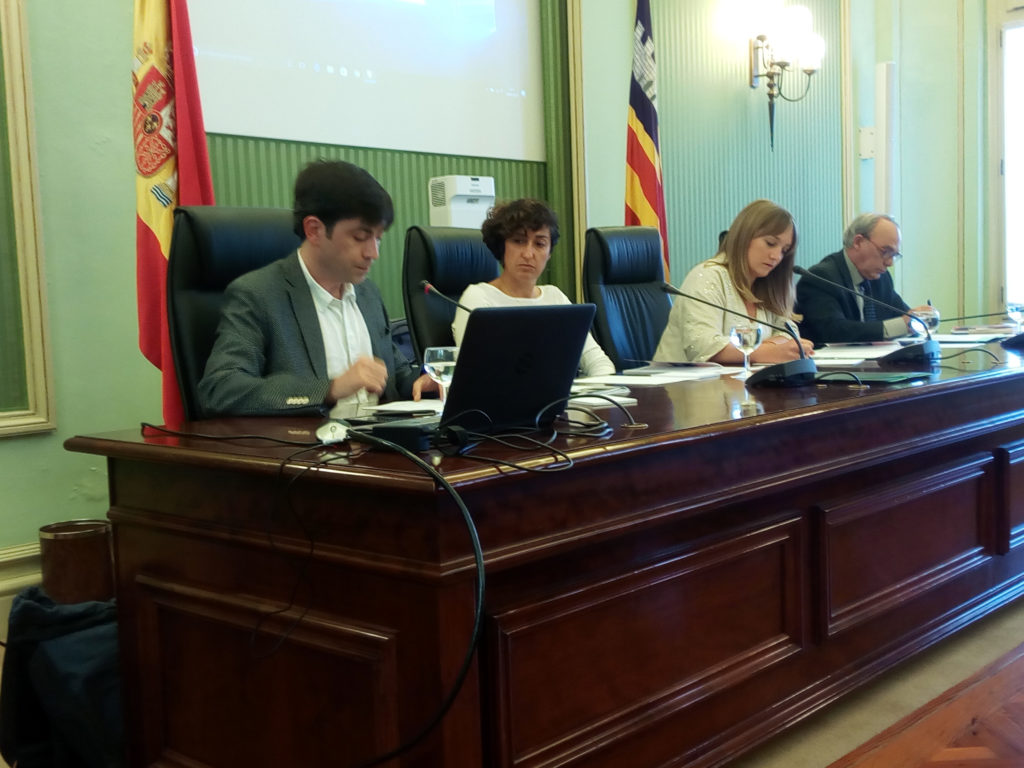Madrid MMM2017: Sowing Change

For 21 years, The Madrid Global Marihuana March has been filling the streets of the city with pleasant smoke and more tangible and urgent demands. A good atmosphere where people ask and hope for change that is now felt imminent.
Each year, for the past twenty-one years, the Global Marihuana March (abbreviated to MMM2017 in Spanish) brought thousands of people into the streets of Madrid, mixing celebration and people’s demands. Different currents from the cannabis movement tried to convey unity and demanded legal change, in a moment when many regulation processes are in abundance, and it seems as though no one wants to be left out of the picture.
As many other cities in the world, every year Madrid hosts the Global Marihuana March (MMM). This year’s motto was “Sow Change. Grow your rights.” The march was convened by AMEC, the Madrid association which organized it the first time, FAC, MADFAC and Responsible Regulation (Regulación Responsable). Thousands responded to the call.
Protesters during “Sowing Change” march, organized by the FAC. From left to right: Javier Puig, Nerea Ahedo, Patty Amiguet, Anna Azamar and Fernando Aranaz “Lucky”
A Day of Debate to Warm Up the Engines
Two days before the beginning of the MMM2017, Thursday, May 4, the FAC decided to organize two round tables at the Cultural Centre Lavapies in order to assess the current status of cannabis regulation in Spain. One of them was composed of activists and the other of political parties. However, since Unidos Podemos (United We Can) and the PSOE could not attend, and only the ERC and PNV were present, at the end, the two tables were joint together. Change was the winner of the debate, since this time there was a direct exchange between political representatives and users. In addition to the dozens of people present in the room, hundreds were following the event via Periscope.
Fernando Aranaz “Lucky” from AMEC was the moderator of the debate, in which FAC president, Javier Puig, President of the Catalonian federation CATFAC, Patty Amiguet, Basque Nationalist Party (BNP)– Partido Nationalista Vasco – Senator, Nerea Ahedo, Catalan Republican Left (CRL) – Esquerra Republicana de Catalunya – Senator, Anna Azamar, and myself, as FAC spokesperson and Pannagh president, participated. For more than two hours we reviewed ongoing political initiatives and we analyzed the perspectives for the future. We also spoke of the situation of the legal processes against cannabis associations, especially those awaiting resolution, like the Pannagh case. The general impression was that the creation of a parliamentary presentation on cannabis regulation (which is considered necessary and possible) could delay the resolution of these cases since the Constitutional Court would unlikely pronounce itself on legal matters that could change shortly.
The atmosphere was light and all the participants were optimistic about the possibility of a new cannabis regulation in the medium term, but there was also consensus that the proposal on the regulation of medical cannabis by Ciudadanos (Citizens), being a good thing, is insufficient, and that the Popular Legislative Initiative about cannabis associations and personal cannabis growing did not go far enough. There was consensus too that in order to resolve the current situation and be able to change the Criminal Code and the Law of Citizen Security, a debate in the General Courts must take place.
We were also able to find out that in the agreement made between the BNP and the PP in order to approve the National Budget, in which the nationalists have received many concessions in exchange for their votes, the action of unconstitutionality presented by the Rajoy’s administration against a section of the Basque Addiction Law, which deals with cannabis associations, is not included. There were high expectations on this matter because if the action of unconstitutionality were removed, it would be possible for regional parliaments to regulate cannabis associations, especially now that most of them are seriously considering this possibility. Truth is that this will be the last point to be negotiated, and there does not seem to be many chances that the PP changes its mind, considering that Fracisco Babín, the person responsible for the National Plan on Drugs, refuses to change a single comma in the current cannabis legislation, if it is not to make it tougher.
Balloons filled the Puerta del Sol before the beginning of the MMM2017
An Afternoon in a Balloon
As it is now tradition, the Saturday during which the march took place, the AMEC headquarters on 23rd Salitre Street, right in the middle of the borough of Lavapiés, boiled in activity since noon. The main activity between joints and home-made food was the inflation and attaching of a thousand green balloons printed with the cannabis leaf logo and the motto “No gags, no more fines” (in reference to the Law of Citizen Security). They were later distributed among those in the protest. In fact, these balloons are the most distinctive feature of the Madrid convocation and became the selected image for the poster.
Just before 6 pm, activists from all over Spain, were leaving the headquarters to walk towards Puerta del Sol, the departing point of the march. And like every year, many of the balloons did not make it that far because many of the people that saw us asked us for one or many balloons to take on the street, to attach to their balconies, or to put on their cars. Many people joint the march as soon as they found out what it was about. In fact, many MMM participants join the march spontaneously as soon as they see it, usually after taking a selfie in front of the march banner. Not many of the street protests taking place in Madrid are able to attract the curiosity of the tourists so successfully.
The march route between Montera and Gran Via, all the way to Plaza de España, is only 1.4-kilometer long, not more than 15 minutes at a slow pace. Nonetheless, it took nearly 2 hours for the protest to complete this distance, march attendees are usually in no rush to finish the protest. And why would we when we can smoke on the street without being fined, demonstrate without being disturbed, when there is a batucada animating the crowd pushing us to dance, and when there is a handful of bars and stores on the sides where we can take refreshments, why would we hurry ourselves to make it to the end?
After 21 years of uninterrupted marches, the Madrid Global Marihuana March has become a quiet and festive event, without losing an inch of its dissenting character, especially now when its motives are more relevant than ever before. After a difficult beginning with much police pressure and many attempts at preventing or hiding the existence of the MMM, the event has now almost been normalized, as a consequence of what happens in the world. At least for one day, the police escort us instead of frisking us, ignoring the smell of marihuana that floods Gran Via street, and many of the people that see us, applaud us and encourage us, some show surprise (especially tourists, depending on where they come from), but no one shows disagreements or anger. This is proof that things have changed and that we are no longer considered to be stinkers or aliens, that what we have been asking for is finally being assumed by the whole of society.
The march was far from boring, with thousands of participants at its high point, even though real attendance is hard to determine, for the long duration of the event (four hours since the official beginning until the end of the musical performances) made many people leave and many others join in before the end. As a matter of fact, by the beginning of the final act, most of the people had already left. There were many banners, with mottos such as “Allow personal growing for medical purposes”, “Sow your rights, harvest your freedoms”, “Cannabis prohibition seriously harms your country’s economy” or “Thorough regulation now!”. Slogans were also chanted, initially with great enthusiasm until the energy ran out, and those left with some used it to dance.
The front of the March arriving at the end of the Gran Vía
Manifest for Change
The protest ended at Plaza España, where there was a final act and music until 10 pm. CATFAC president, Patty Amiguet and Responsible Regulation president, Clara Torrijos (@ClaraMaTv), both founders of REMA (Anti-prohibitionist Women’s State Network or Red Estatal de Mujeres Antiprohibicionistas) read the MMM 2017 manifest together. The text called for respect to all the regulation initiatives currently taking place, on the idea that everything counts, and also for a consideration of gender when we speak of regulating cannabis. Both women seemed very excited at the end or their speeches and ended up embracing one another.
Among other things, the manifest said, “let it be known at once that we do not wish to break the laws, but to take part in designing new ones!” The demand to be taken into account and to end the immobilism of the current Government, was one of the main points of the speech, together with the proof that what is lacking is political will to carry out the legal changes that are now being demanded by the general population, the courts, and the security forces, in addition to those affected by the war on drugs. The need to make the proposals of the cannabis movement more inclusive was highlighted, the establishment of alliances with other social movements was deemed necessary.
Clara Torrijos (left) and Patty Amiguet read the manifest at Plaza de España
New Appointment on May 28
This year the MMM2017 is not alone in the calendar. On May 28, Madrid will host another great cannabis event, the Mani-fiesta-acción (Mani-party-action), which expects to gather thousands of people at the Puerta del Sol from 17:00 to 21:00, with a political act and a long list of guest artists
Appearance in Court of ICEERS and FAC before the Balearic Islands Parliament
Four days after the MMM2017, on May 10, the Balearic Parliament Commission on Health celebrated the appearance of Óscar Parés, ICEERS Foundation deputy director, and mine, on behalf of the FAC, in the context of the presentation on the study of cannabis social clubs regulation (abbreviated to CSC in Spanish) and cannabis therapeutic use. Parés spoke first and explained some interesting features of the CSC from a risk-reduction perspective, using a study, for the most part, done in Catalonia.
Òscar Parés appears before Balearic Parliament Commission on Health
I was in charge of explaining the current situation of legal uncertainty to which cannabis associations are exposed, as well as the legal and political process that has taken us all the way here. I also explained that the relationship between medical cannabis and the CSC is only circumstantial, that the therapeutic use of cannabis is an exclusive mandate of the healthcare system, that the possibility of an alternative way to have access to cannabis would only happen through comprehensive regulation, and that if we take care of this issue in actuality it is because the system does not provide any options to the patients, jeopardizing their right to health. All the attending groups thanked both speakers, and said that they had helped clarify important doubts, they also asked many questions.
420 Intel is Your Source for Marijuana News
420 Intel Canada is your leading news source for the Canadian cannabis industry. Get the latest updates on Canadian cannabis stocks and developments on how Canada continues to be a major player in the worldwide recreational and medical cannabis industry.
420 Intel Canada is the Canadian Industry news outlet that will keep you updated on how these Canadian developments in recreational and medical marijuana will impact the country and the world. Our commitment is to bring you the most important cannabis news stories from across Canada every day of the week.
Marijuana industry news is a constant endeavor with new developments each day. For marijuana news across the True North, 420 Intel Canada promises to bring you quality, Canadian, cannabis industry news.
You can get 420 Intel news delivered directly to your inbox by signing up for our daily marijuana news, ensuring you’re always kept up to date on the ever-changing cannabis industry. To stay even better informed about marijuana legalization news follow us on Twitter, Facebook and LinkedIn.




